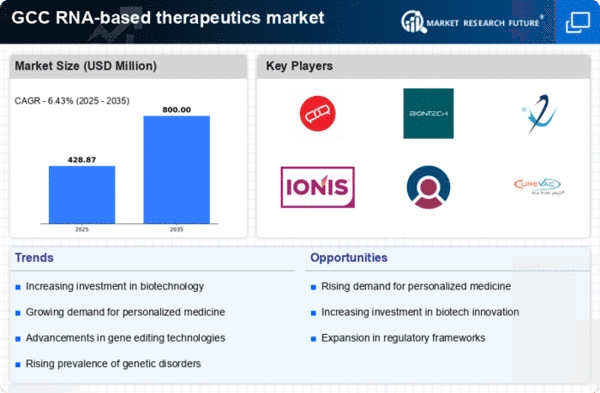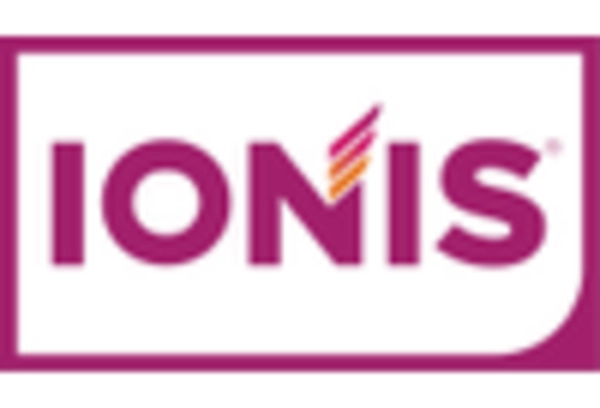Government Support and Funding
Government initiatives aimed at fostering biotechnology and pharmaceutical innovation are significantly impacting the RNA-based therapeutics market. In the GCC, various governments are allocating substantial funds to support research and development in this field. For instance, initiatives to establish biotechnology hubs and innovation centers are being implemented, which are likely to attract both local and international investments. This supportive environment is crucial for the advancement of rna based therapies, as it encourages collaboration between academic institutions and industry players. The financial backing from governments is expected to catalyze the growth of the rna based-therapeutics market, with funding levels potentially reaching hundreds of millions of dollars in the coming years.
Increasing Focus on Rare Diseases
The rising awareness and focus on rare diseases in the GCC region are driving the demand for RNA-based therapeutics. Many rare diseases have a genetic basis, making rna based therapies particularly suitable for treatment. As healthcare providers and policymakers prioritize rare disease management, the rna based-therapeutics market is likely to benefit from increased research and development efforts. The establishment of specialized treatment centers and patient registries is also contributing to this trend, facilitating better access to innovative therapies. Market analysts suggest that the rna based-therapeutics market could see a compound annual growth rate (CAGR) of around 12% as more rare diseases are addressed through targeted rna interventions.
Advancements in Delivery Mechanisms
Innovations in delivery systems for RNA-based therapeutics are enhancing their efficacy and safety, thus propelling the market forward. The development of lipid nanoparticles and viral vectors has shown promise in improving the delivery of rna molecules to target cells. These advancements are particularly relevant in the GCC, where there is a growing emphasis on precision medicine. Enhanced delivery mechanisms not only increase the therapeutic potential of rna based treatments but also reduce potential side effects, making them more appealing to healthcare providers and patients alike. As a result, the rna based-therapeutics market is expected to witness substantial growth, with projections indicating a market value exceeding $5 billion by 2027 in the GCC region.
Rising Prevalence of Genetic Disorders
The increasing incidence of genetic disorders in the GCC region is driving the demand for innovative treatment options, particularly in the RNA-based therapeutics market. Genetic disorders such as cystic fibrosis and muscular dystrophy are becoming more prevalent, necessitating advanced therapeutic solutions. The GCC countries are witnessing a rise in genetic testing and screening programs, which further highlights the need for effective rna based therapies. As healthcare systems in the region evolve, the focus on personalized medicine is likely to grow, with rna based-therapeutics playing a crucial role in addressing these genetic challenges. The market is projected to expand significantly, with estimates suggesting a growth rate of over 15% annually, reflecting the urgent need for targeted therapies in the GCC healthcare landscape.
Collaboration Between Academia and Industry
The collaboration between academic institutions and industry players is fostering innovation in the RNA-based therapeutics market. In the GCC, partnerships are being formed to leverage academic research and translate it into viable therapeutic solutions. These collaborations often result in the sharing of resources, expertise, and funding, which can accelerate the development of rna based therapies. Furthermore, such partnerships are likely to enhance the clinical trial process, enabling faster evaluation of new treatments. As a result, the rna based-therapeutics market is expected to experience robust growth, with collaborative efforts potentially leading to the introduction of several new therapies in the next few years.

















